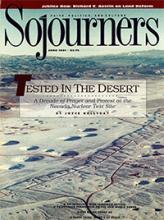How does a director make a movie about torture that allows audiences to watch without turning away, but does not allow them to forget that torture is a violation of human sacredness that is going on this second?
To my knowledge, most serious movies about torture have been documentaries. But in Closet Land, a nameless man and woman interact in the surrealistic interrogation room of an unidentified country. And, although the film has definite faults, it succeeds in making the viewer breathe the terrifying air of that room in a way that cannot be shaken off when the lights come up.
The victim in Closet Land is a writer, a children's book author who tells the interrogator sincerely, "I'm not a political person. My stories are fluff." Her tormentor counters that children's minds make the best receptacles, and that her latest story is "thinly veiled anti-government propaganda." All the woman need do to obtain her freedom is sign a statement to that effect. She refuses.
Psychological torture is frighteningly well-portrayed. From the start, the interrogator plays brutal mind games -- pretending to let the woman go only to lock the door when she hesitates, acting as her comforter one minute ("You must put your trust in me") and striking her the next, switching on government tapes of her most intimate conversations. The central images are of intricate psychological, not physical, cruelty, and the viewer learns the truth of the warning, "It's the suspense, not the pain, that will drive you mad."
Read the Full Article
